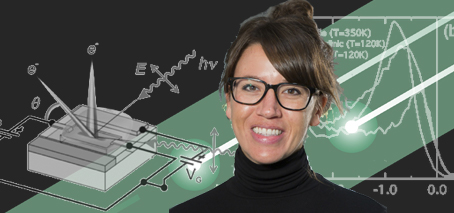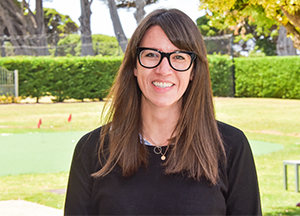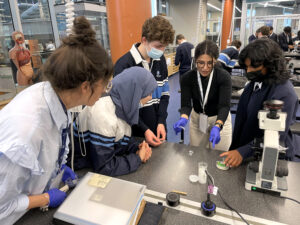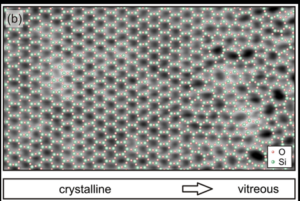Congratulations to FLEET’s Dr Julie Karel (Monash), receiving a Victorian 2022 Young Tall Poppy Science Award, recognising her research in functional amorphous materials for future ultra-low energy electronics, and in science outreach.
The Young Tall Poppy awards, an initiative of the Australian Institute of Policy and Science, recognise excellence in research as well as enthusiasm for communicating science beyond the walls of the laboratory.
Research Julie Karel’s research in functional materials in future ultra-low energy electronics has the potential to make a substantial impact, underscored by the significant funding (>$3.6M) she has been able to secure.
Julie’s research targets the unsustainable energy consumed by Information technology and communication, estimated to consume 8% of global electricity, and doubling every decade.
“Although the past 5-8 years have seen rapid progress in this area,” says Julie, “many of the new materials developed use expensive rare elements that decompose in air and are not compatible with current manufacturing methods.”
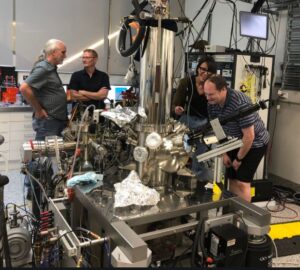
In the STM labs with collaborators from MacDiarmid Institute (NZ) and Monash School of Physics and Astronomy
Instead, Julie’s work involves materials that are abundant and compatible with existing fabrication technology, so not only do they reduce the energy consumption of electronic devices but they make the devices inexpensive and sustainable to produce. This could substantially reduce the large environmental and economic footprint of IT devices.
To improve the efficiency of these technologies, the materials’ magnetic and electronic properties must be carefully controlled.
Julie’s team at Monash studies amorphous materials – an example of which is glass. Unlike crystalline solids commonly used in electronics, whose atoms are arranged periodically, the atomic positions in an amorphous solid are random.
“I have shown that the magnetic and electronic properties of the material can be as good, if not better than, the crystalline analogue, making the device more efficient,” says Julie.
The key advantages of using amorphous over crystalline materials is that that they are low cost, easier to fabricate, and allow a wider range of tunability in the magnetic and electronic properties. Julie is focussed on demonstrating a particular quantum effect (QAHE), which has been predicted theoretically in amorphous materials but never yet observed experimentally.
If demonstrated, this effect would mean an amorphous material could conduct electricity without loss of energy due to resistance.
Outreach Since volunteering to teach rural Nicaraguans how to build their own wind turbines, Julie has been passionate about public outreach and enthusing people to lower their energy footprint. She regularly speaks to students, leads hands-on science experiments at schools, and shares her knowledge with the community through Melbourne Knowledge Week and Open Day.
To explain the nature of her work, for example, she demonstrates how to measure the magnetic and electronic properties of materials at different temperatures.
Dr Karel inspires with a clear, infectious passion for her research: after a recent informal lab tour and explanation research at numerous synchrotrons, two female Grade 8 students left with the resolve to study STEMM.
In Julie’s role as the Chair of the FLEET Outreach Committee, she has made scientific literacy one of the key goals of the Centre’s outreach activities, and with the committee and FLEET outreach coordinator Jason Major she is developing methods such as pre- and post- activity questionnaires and participant surveys to better measure the impact of these activities.
“I believe outreach is a critical part of our job as academics to ensure that the public good of our work is broadly understood,” says Julie.
“As FLEET’s Outreach Chair I am responsible for overseeing the Centre’s outreach activities aimed primarily at school students and the general public. Each FLEET member is expected to complete 20 hours of outreach per year, and these activities are facilitated and organised by the Outreach Committee. They include, for instance, participation in public outreach events such as National Science Quiz, Melbourne Knowledge Week (MKW), and University Open Days.
Julie has given talks about her own research at Knowledge Week and Monash Open Days, and has worked with students through John Monash Science School, the Goethe Institute, and Engineering Girls, speaking with girls about careers in STEMM and what it is like to study engineering.
Currently, FLEET’s outreach committee is organising outreach at a school in country Victoria while also developing metrics to better track how our outreach impacts different audiences.
Tall Poppies The Young Tall Poppy Science Awards are widely considered to be an early indicator of Australia’s future scientific leaders, identifying excellent early career scientists.
Over 900 Tall Poppy scientists have previously been acknowledged for their scientific and communication excellence. See previous winners on the AIPS website.
The 2022 Awards Ceremony will be held in October at Quantum Victoria, with representatives of AIPS and the wider scientific community, and announcing the Victorian Young Tall Poppy Scientist of the Year from amongst the awardees.

